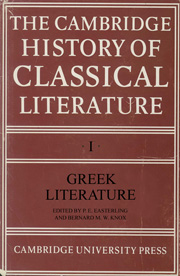Book contents
- Frontmatter
- 1 Books and readers in the Greek world
- 2 Homer
- 3 Hesiod
- 4 The epic tradition after Homer and Hesiod
- 5 Elegy and iambus
- 6 Archaic choral lyric
- 7 Monody
- 8 Choral lyric in the fifth century
- 9 Early Greek philosophy
- 10 Tragedy
- 11 The satyr play
- 12 Comedy
- 13 Historiography
- 14 Sophists and physicians of the Greek enlightenment
- 15 Plato and the Socratic work of Xenophon
- 16 Oratory
- 17 Aristotle
- 18 Hellenistic poetry
- 19 Post-Aristotelian philosophy
- 20 The literature of the Empire
- 21 Epilogue
- Appendix of authors and works
- Metrical appendix
- Works Cited in the Text
- References
2 - Homer
Published online by Cambridge University Press: 28 March 2008
- Frontmatter
- 1 Books and readers in the Greek world
- 2 Homer
- 3 Hesiod
- 4 The epic tradition after Homer and Hesiod
- 5 Elegy and iambus
- 6 Archaic choral lyric
- 7 Monody
- 8 Choral lyric in the fifth century
- 9 Early Greek philosophy
- 10 Tragedy
- 11 The satyr play
- 12 Comedy
- 13 Historiography
- 14 Sophists and physicians of the Greek enlightenment
- 15 Plato and the Socratic work of Xenophon
- 16 Oratory
- 17 Aristotle
- 18 Hellenistic poetry
- 19 Post-Aristotelian philosophy
- 20 The literature of the Empire
- 21 Epilogue
- Appendix of authors and works
- Metrical appendix
- Works Cited in the Text
- References
Summary
THE POET AND THE ORAL TRADITION
What would the world be like if the Iliad and Odyssey had utterly perished, or been preserved only in fragments? The question hardly bears thinking about. Yet only a fraction of Greek tragedy has survived — why then are we so fortunate in the case of Homer, who lived and worked some three hundred years earlier than the great tragedians, long before the era of libraries and a developed book-trade, probably even before writing itself was seriously applied in Greece to the composing and recording of works of literature? The main reason is that Homer was from the beginning the most admired poet of Hellenic and Hellenized antiquity, and remained so until near its end. He seemed to embody the spirit of an age of heroes, yet never looked old-fashioned like Aeschylus or morally dubious like Euripides. Learning his poetry by heart was an essential part of ordinary education, and that, more than anything, is what saved it from fragmentation and decay in the first centuries after his death. Once consigned to writing, the text gradually achieved a standard form. The written versions ran wild at first, but were slowly reduced to order by scholars and librarians in Athens, Alexandria and Pergamum from the fifth to the second centuries B.C. For hundreds of years even after that, as is shown by the ruins of Graeco Roman settlements along the Nile, on the dry escarpments where papyrus books happen to survive, the Iliad and Odyssey were still widely read, more popular even than the lowbrow and more modern works of Menander.
- Type
- Chapter
- Information
- The Cambridge History of Classical Literature , pp. 42 - 91Publisher: Cambridge University PressPrint publication year: 1985
References
- 18
- Cited by

